 The more than 38,000 people interviewed in the Global Attitudes survey are overwhelmingly dissatisfied with the way things are going in their countries today. Solid majorities in nearly every country in every region surveyed say they are unhappy with the state of their nation.
The more than 38,000 people interviewed in the Global Attitudes survey are overwhelmingly dissatisfied with the way things are going in their countries today. Solid majorities in nearly every country in every region surveyed say they are unhappy with the state of their nation.
Although just four-in-ten Americans (41%) have a positive view of national conditions, people in the United States rank as one of the more contented populations in the world. Canada is the only country in the West where a majority of those surveyed (56%) is satisfied with the way things are going. The other relatively happy publics are in less open societies: China, Pakistan, Uzbekistan and Vietnam.
There are great disparities in national satisfaction within and between regions. People in Canada and the United States are four times more likely than Latin Americans to express satisfaction with the state of their nation. There is a smaller but still substantial divide in Europe. People in Western Europe are twice as likely as those in most East European nations to give a positive rating to national conditions, though Czechs have more in common with the west than the east on this question.
Similarly, respondents in China and Vietnam are much more satisfied with their country than are people in most other parts of Asia. In Africa, satisfaction is highest in Tanzania, Angola, Uganda and Mali. All of these countries have economically outperformed their regional counterparts in recent years.
The Middle East/Conflict Area is the only region where there is no apparent relationship between satisfaction with the state of affairs in the country and recent national economic performance. Among these countries, satisfaction is highest in Pakistan and Uzbekistan, though other nations have grown faster.
National Economies Viewed Negatively
 By an overwhelming margin in almost all countries, people have a negative view of economic conditions in their country. This perception is particularly prevalent in countries where the economy is performing very poorly: in Latin America and in Japan, where economies are expected to shrink in 2002; most of Eastern Europe, where growth is slowing; much of Africa, where inflation remains strong; and in Indonesia and Turkey, which are actually growing faster this year than last but still live under the burden of huge international debts.
By an overwhelming margin in almost all countries, people have a negative view of economic conditions in their country. This perception is particularly prevalent in countries where the economy is performing very poorly: in Latin America and in Japan, where economies are expected to shrink in 2002; most of Eastern Europe, where growth is slowing; much of Africa, where inflation remains strong; and in Indonesia and Turkey, which are actually growing faster this year than last but still live under the burden of huge international debts.
Among the 44 countries surveyed, majorities in just seven give their nation’s economy a favorable rating. These positive attitudes can be explained in part by recent economic trends. In Canada, where seven-in-ten rate conditions as good, both the economy and the number of jobs are growing the fastest among major nations. In Great Britain, which is outperforming the rest of Europe, 65% see the economy as good.
While people are profoundly pessimistic about the current state of their country’s economy, they are strongly optimistic about their national economic prospects over the next year. In 27 of the 44 countries surveyed, a plurality or majority think the economy will get better. Some of the most optimistic people live in Africa – in Mali (87%), Ghana (81%) and the Ivory Coast (80%) – where overwhelming majorities of the people think economic conditions will improve over the next 12 months.
Nearly half of Americans (48%) think the economy will brighten. But only a third of the French (32%) and one-in-five Russians (22%) agree. In only four nations, Lebanon (58%), Turkey (49%), the Slovak Republic (44%) and Argentina (33%) is the dominant sentiment that the economic situation will get worse. In other countries – including most of Europe both East and West, China, Japan and Canada – people are neither optimistic nor pessimistic; they think the economic future will look a lot like the present.
Where Optimism Prevails
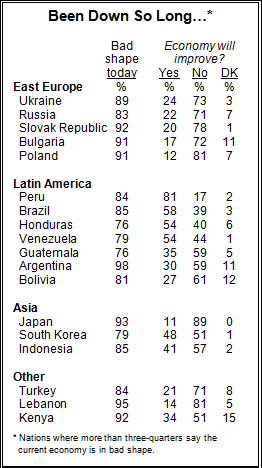 People in the Western Hemisphere nations are generally more optimistic than those in Europe. And within Europe, Western Europeans have a slightly brighter view of the economic future than do those in the East. This division is seen starkly in Germany itself, where 42% of those surveyed in what was formerly West Germany think the economy will improve, compared with only 27% who have such faith in former East Germany.
People in the Western Hemisphere nations are generally more optimistic than those in Europe. And within Europe, Western Europeans have a slightly brighter view of the economic future than do those in the East. This division is seen starkly in Germany itself, where 42% of those surveyed in what was formerly West Germany think the economy will improve, compared with only 27% who have such faith in former East Germany.
Attitudes about the economy over the next year vary widely in Asia and the Middle East/Conflict Area. Those surveyed in Egypt (46%) are much more optimistic than those in Lebanon (14%). The public in South Korea (48%) is slightly more upbeat about the future than those in China (36%) or India (36%).
Significantly, in many countries in which there is general pessimism over current conditions, most people have hope for the future. In these nations, the public may feel that the economy is so bad today it can only get better in the future. In Peru, for example, 84% of those surveyed lament current economic conditions, but 81% think the economy will brighten within a year. There is a similar combination of deep anxiety about present economic conditions with strong faith in a better future in other Latin American nations such as Brazil, Honduras and Venezuela, as well as in Nigeria.
 But in a number of countries – including Argentina, Turkey, Poland, Bulgaria, Ukraine and the Slovak Republic — the public is mired in pessimism, with people thinking things are bad today and will not improve or could even get worse over the next year. The deepest gloom is in Japan, where 93% of the public gives the economy a bad grade today and 89% think present conditions will last or deteriorate.
But in a number of countries – including Argentina, Turkey, Poland, Bulgaria, Ukraine and the Slovak Republic — the public is mired in pessimism, with people thinking things are bad today and will not improve or could even get worse over the next year. The deepest gloom is in Japan, where 93% of the public gives the economy a bad grade today and 89% think present conditions will last or deteriorate.
In Their Own Words…Economy Is Top Concern
When people are asked to describe in their own words the top problem facing their country, the economy also dominates. This is consistent with the finding that in countries around the world, people volunteer the economy as their most important personal problem.
This is particularly the case in Africa and the Middle East/Conflict Area. In several countries in these regions, including Angola, Ghana, Kenya, Pakistan and Turkey, more than eight-in-ten respondents volunteered the economy as their nation’s most important problem, with joblessness among their primary concerns.
 Economic anxiety also is widespread throughout Latin America. In that region, general economic problems are cited as the principal national concern in most nations, especially in Peru (84%) and in Bolivia (77%), Venezuela (76%). Unemployment is again what troubles people the most.
Economic anxiety also is widespread throughout Latin America. In that region, general economic problems are cited as the principal national concern in most nations, especially in Peru (84%) and in Bolivia (77%), Venezuela (76%). Unemployment is again what troubles people the most.
Yet there are exceptions to this pattern, including the United States, where terrorism and the threat of war are mentioned more frequently than economic troubles, poverty or unemployment. In South Korea, issues such as corruption, political power struggles, and problems with North Korea are raised by seven-in-ten of those questioned. And in the Czech Republic, Great Britain and Nigeria, more people cite political problems than more general economic concerns. Their complaints are frequently about government corruption and inefficiency.
Rating National Problems
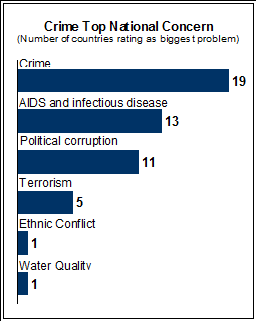 The broad range of issues afflicting global publics is also seen when people are asked to rate the importance of specific problems their country may face. In 19 of the 44 countries in the Global Attitudes survey, more people rate crime as a “very big problem” than any other issue. This is the case in most of Western and Eastern Europe, and in five of eight nations surveyed in Latin America.
The broad range of issues afflicting global publics is also seen when people are asked to rate the importance of specific problems their country may face. In 19 of the 44 countries in the Global Attitudes survey, more people rate crime as a “very big problem” than any other issue. This is the case in most of Western and Eastern Europe, and in five of eight nations surveyed in Latin America.
Respondents in 13 nations rate AIDS and infectious diseases as the principal threats, especially in Africa where they are the number one concern in eight of ten countries surveyed. Corruption ranks a close third, with people in 11 countries saying it is their nation’s biggest problem. Ethnic strife is the greatest concern only in Senegal, water problems only in Jordan. And nowhere are immigration, emigration, moral decline or the quality of public schools seen as the principal national problem.
Global Crime Epidemic
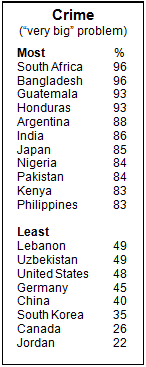 There is nearly universal anxiety over crime. In fact, in every region but North America majorities in nearly every country cite crime as a “very big problem.” Only in Jordan, Canada, China and South Korea is crime seen as a lesser concern.
There is nearly universal anxiety over crime. In fact, in every region but North America majorities in nearly every country cite crime as a “very big problem.” Only in Jordan, Canada, China and South Korea is crime seen as a lesser concern.
The extent of public anxiety about crime is most evident in Latin America. Roughly nine-in-ten respondents in Guatemala, Honduras and Argentina rate crime as a very big problem; no fewer than 65% in any country in the region view this as a major concern. This is consistent with the responses Latin Americans give when they are asked in an open-ended format to name their most pressing national problem. More Hondurans volunteer crime, particularly delinquency, than any other issue; it is the second leading concern in Mexico and Guatemala, where delinquency, robberies and vandalism are a problem.
But crime is not just a concern in poor countries. More Europeans rate crime as a very big problem than any other issue; the lone exception is the Slovak Republic. And nearly half of Americans view crime as a very big national problem, putting it on par with terrorism and moral decline as the top national issues.
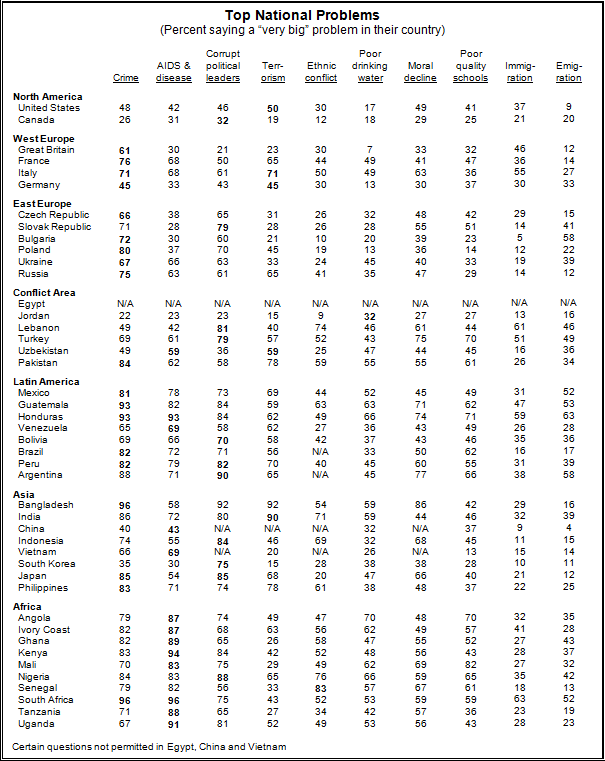
Corruption: A Related Concern
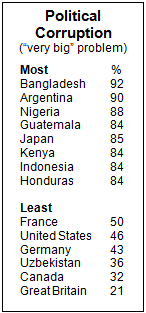 In many nations, worries about crime and political corruption go hand in hand, with similarly large majorities citing both as major problems. In Japan, for example, 85% see crime as a very big problem and the same number say that about corruption. The notable exception is Great Britain, where six-in-ten people (61%) view crime as a significant problem, but only two-in-ten (21%) say that about official corruption.
In many nations, worries about crime and political corruption go hand in hand, with similarly large majorities citing both as major problems. In Japan, for example, 85% see crime as a very big problem and the same number say that about corruption. The notable exception is Great Britain, where six-in-ten people (61%) view crime as a significant problem, but only two-in-ten (21%) say that about official corruption.
Dishonest political leaders are a prevalent national concern in Latin America. Nine-in-ten Argentines rate corruption as a very big problem, more than any other issue. It also is the leading concern in Peru (82%) and Bolivia (70%), and it ranks only behind crime in Guatemala (84%). Yet corruption also is a dominant concern in Asia and Eastern Europe. More than seven-in-ten respondents in every Asian country, and at least six-in-ten in every Eastern European country, rate corruption as a national problem.
AIDS Impact Felt Well Beyond Africa
 As might be expected, concern over the spread of infectious diseases is highest in Africa, where AIDS, tuberculosis, malaria and other illnesses have taken a deadly toll. Nine-in-ten respondents in South Africa, Kenya and Uganda judge disease a “very big problem,” while eight-in-ten share that judgment in the other African nations in the survey.
As might be expected, concern over the spread of infectious diseases is highest in Africa, where AIDS, tuberculosis, malaria and other illnesses have taken a deadly toll. Nine-in-ten respondents in South Africa, Kenya and Uganda judge disease a “very big problem,” while eight-in-ten share that judgment in the other African nations in the survey.
But worry about AIDS and other diseases is nearly as great in Latin America, where overwhelming majorities – 93% in Honduras, 82% in Guatemala and 79% in Peru – see the spread of disease as a major problem. Asians are only slightly less concerned about AIDS and other epidemics.
By contrast, in North America and Europe, where preventive health measures are more readily available than in other parts of the world, AIDS and other infectious diseases are less of a concern. Among these countries, only in France, Italy, Ukraine and Russia do strong majorities think the spread of infectious illnesses is a major threat to their nations. The nation least concerned about the spread of disease is Jordan, where fewer than one-in-four (23%) see such health problems as a big national problem.
Latin America’s Terrorism Fears
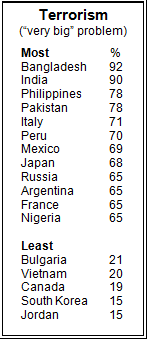 A little over a year after Sept. 11, it is hardly surprising that half those surveyed in the United States (50%) say terrorism is a very big problem, ranking it above moral decline, crime or corruption. But concern over terrorism is even greater in countries where terrorist attacks have been part of life for years.
A little over a year after Sept. 11, it is hardly surprising that half those surveyed in the United States (50%) say terrorism is a very big problem, ranking it above moral decline, crime or corruption. But concern over terrorism is even greater in countries where terrorist attacks have been part of life for years.
Nine-in-ten in Bangladesh (92%) and India (90%) and nearly eight-in-ten in Pakistan (78%) cite terrorism as a major issue. Terrorism concerns are even more widespread in Latin America, where majorities in every country identify it as a very important problem for the country. In other parts of the world, fear of terrorism varies from nation to nation. South Koreans and Canadians are among the least likely to rate terrorism as a major threat.
Competing Concerns
The level of concern over other national issues varies widely from region to region, and often within regions:
Education is seen as a major problem throughout Latin America, in much of Africa and in Pakistan and Turkey. On average, six-in-ten respondents in Latin America and more than half of Africans view poor schools as a top national concern. The Vietnamese, Poles and Bulgarians are the least worried about their schools.
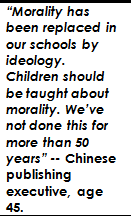 Concern about moral decline is particularly high in countries with large Muslim populations, especially in Bangladesh (86%), Turkey (75%), Mali (69%) and Indonesia (68%). More broadly, the perceived breakdown in social moral order – as reflected in public concern about crime, political corruption and moral decline – is often sharply felt in Muslim nations, where strong majorities are very troubled by this nexus of issues.
Concern about moral decline is particularly high in countries with large Muslim populations, especially in Bangladesh (86%), Turkey (75%), Mali (69%) and Indonesia (68%). More broadly, the perceived breakdown in social moral order – as reflected in public concern about crime, political corruption and moral decline – is often sharply felt in Muslim nations, where strong majorities are very troubled by this nexus of issues.
But these concerns also are widespread in many traditionally Catholic countries – Honduras, Guatemala, Argentina, Peru and Italy. Moral decline also is the second most cited major problem in the United States. In general, those least concerned about moral issues live in relatively secular societies, such as Canada, Great Britain and Germany.
Ethnic conflict is a major concern in nations with a recent history of civil strife: Senegal (83%), Nigeria (76%), Lebanon (74%), India (71%), and Indonesia (69%). Racial, religious and ethnic tensions are less likely to be seen as a top national problem in major industrial societies.
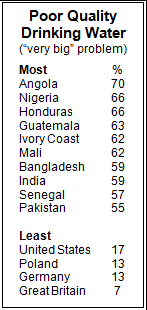 Nevertheless, half of Italians and more than four-in-ten French cite ethnic discord as a major national concern, as do three-in-ten Americans, British and Germans. Jordanians (9%), Bulgarians (10%), Canadians (12%), Poles (19%) and Japanese (20%) are the least likely to think ethnic conflict is a big issue in their societies.
Nevertheless, half of Italians and more than four-in-ten French cite ethnic discord as a major national concern, as do three-in-ten Americans, British and Germans. Jordanians (9%), Bulgarians (10%), Canadians (12%), Poles (19%) and Japanese (20%) are the least likely to think ethnic conflict is a big issue in their societies.
Meanwhile, in very poor nations the absence of simple basic necessities, such as drinking water, remains a serious national concern. Two-in-three people in Angola, Nigeria and Honduras, and six-in-ten in Guatemala, Ivory Coast, Mali, Bangladesh and India worry about the quality or availability of water for daily drinking, cooking and bathing. Somewhat surprisingly, nearly half those surveyed in France, Italy and Japan also complain about their water, suggesting water quality is a problem even in some wealthy nations.
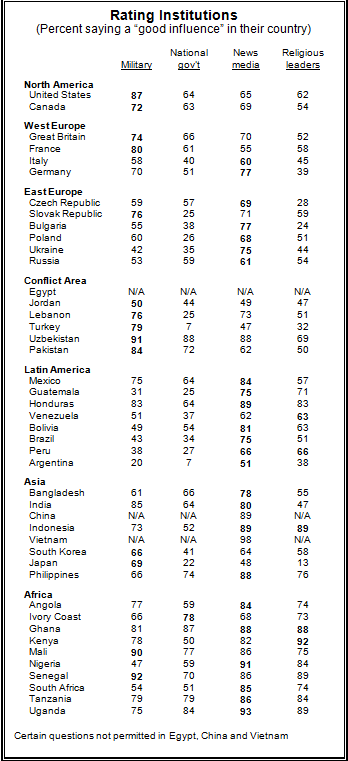
Military Widely Admired
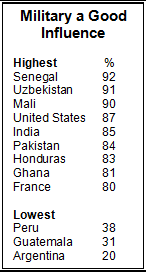 With the exception of Latin America, majorities in nearly every nation surveyed say the military is a good influence on the way things are going in their country. This is particularly noteworthy in Western societies. In the U.S., Canada, Great Britain and France, the armed forces are more admired than the national government, the president or prime minister, the news media, or religious leaders. And in Germany and Italy, the military rates a close second to the news media.
With the exception of Latin America, majorities in nearly every nation surveyed say the military is a good influence on the way things are going in their country. This is particularly noteworthy in Western societies. In the U.S., Canada, Great Britain and France, the armed forces are more admired than the national government, the president or prime minister, the news media, or religious leaders. And in Germany and Italy, the military rates a close second to the news media.
Reflecting the unsettled nature of local conditions, overwhelming majorities of Indians (85%), Pakistanis (84%) Uzbeks (91%) and Turks (79%) give the military high marks. There is also very strong support for the armed forces in most of Africa, particularly in Senegal (92%) and Mali (90%).
But in Latin America, which has recently emerged from a long history of military dictatorships, people take a more skeptical view of their armed forces. Just one-in-five Argentines and just three-in-ten Guatemalans believe their nation’s military has a positive influence. Similarly, many Eastern Europeans, including Ukrainians and Russians, show some wariness of their militaries.
Media Heralded Too
Journalists are often the target of criticism in the United States, but 65% of the American public says that in general the media have been a positive force in society. In Europe, news organizations also get high marks. This is particularly the case in Germany (77% positive), Bulgaria (77%) and Ukraine (75%). The media’s image is somewhat less positive in France, but even there 55% of respondents hold journalists in high regard.
In Germany, the media’s image has improved considerably over the past decade and is now among the highest in the region. In 1991, just half said German newspapers had a good influence on the nation. Journalists are viewed significantly better in every Eastern European country than they were right after the Cold War.
Elsewhere people think even more highly of the news media. In every Latin American country, except Venezuela, and in six of the ten African nations surveyed, the news media is the single most respected national institution. Worldwide, only in Jordan, Turkey and Japan do journalists get positive ratings from less than a majority of the public.
Conflicting Views of Religious Leaders
 In most countries where the Global Attitudes’ polling was conducted, religious leaders are seen as having a positive influence. More than three-in-five Americans look favorably on their spiritual leaders.
In most countries where the Global Attitudes’ polling was conducted, religious leaders are seen as having a positive influence. More than three-in-five Americans look favorably on their spiritual leaders.
Overwhelming majorities in Africa think religious institutions are a “good influence” on their countries, particularly in Kenya, Senegal, Uganda, Tanzania and Nigeria. It is a sentiment shared somewhat less strongly in much of Latin America, especially Honduras and Guatemala.
But in several countries with widely different religious traditions, publics take a much more skeptical view of the influence of religious leaders.
Three-quarters of Japanese (74%) say the influence of religious leaders is at least somewhat negative, and three-in-ten see their influence as “very bad.” Argentines, as well, have at best mixed views of the effect of religious leaders in their country.
In Europe, roughly six-in-ten Germans and Czechs and nearly half of Italians (47%) say religious leaders have at least a moderately negative influence on society. Since 1991, the reputation of religious institutions has improved in the Slovak Republic and Poland, but it has fallen dramatically in the former East Germany, Bulgaria, Ukraine and the Czech Republic.
Among countries with substantial Muslim populations, attitudes toward religious leaders vary widely. Clerics are judged quite favorably in Indonesia (89%), Senegal (89%), Mali (75%) and Uzbekistan (69%). But just half of the Lebanese and Pakistanis agree. In general, the military is held in higher regard than religious leaders in most heavily Islamic nations. This is especially evident in Turkey. More than twice as many respondents in Turkey give the military a good rating as view religious leaders in positive terms (79% vs. 32%).
Fair Marks for Government
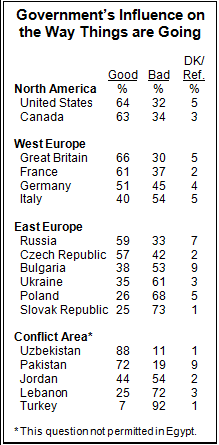 In countries around the world, people are generally more satisfied with their national governments than they are with overall national conditions. In several European countries, as well as the United States, the ratings for government are significantly higher than for the state of the nation.
In countries around the world, people are generally more satisfied with their national governments than they are with overall national conditions. In several European countries, as well as the United States, the ratings for government are significantly higher than for the state of the nation.
Russia is a notable example of these widely differing opinions. Just 20% of Russians say they are satisfied with the way things are going in their country, but three times as many (59%) say the government has a positive influence. This no doubt reflects the broad popularity of Russian President Vladimir Putin.
But there are several countries where ratings for government and national conditions are equally abysmal. In Argentina, just 3% are satisfied with the state of the nation, compared with an equally paltry 7% who see government’s influence as positive. Similarly, in Japan and Turkey the public is down on its government about as much as it is on state of the country.
 For all of the criticism targeted at Washington, Americans are relatively pleased with their national government’s performance. Nearly two-in-three (64%) think it exerts a good influence on the country. As is the case in Russia, President Bush’s popularity may be a factor in the public’s positive assessment. This sentiment is shared in Canada and in Mexico, which give similarly positive marks to their national governments. In Mexico, four times as many respondents have a favorable view of government’s influence as express satisfaction with national conditions (64% vs. 16%).
For all of the criticism targeted at Washington, Americans are relatively pleased with their national government’s performance. Nearly two-in-three (64%) think it exerts a good influence on the country. As is the case in Russia, President Bush’s popularity may be a factor in the public’s positive assessment. This sentiment is shared in Canada and in Mexico, which give similarly positive marks to their national governments. In Mexico, four times as many respondents have a favorable view of government’s influence as express satisfaction with national conditions (64% vs. 16%).
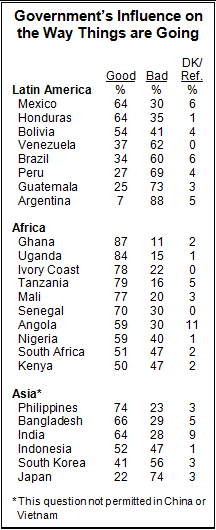 This affirmative assessment is generally shared in Western Europe, where two-thirds of the British surveyed feel good about their government; 61% of French and roughly half of Germans share that sentiment. The majority of respondents in the Czech Republic (57%), which is about to join the European Union, also have a favorable opinion of their government. But in Italy, support for Rome is weak. Just four-in-ten Italians give the government good marks, possibly reflecting the relatively large proportion of Italians (61%) who view political corruption as a major problem.
This affirmative assessment is generally shared in Western Europe, where two-thirds of the British surveyed feel good about their government; 61% of French and roughly half of Germans share that sentiment. The majority of respondents in the Czech Republic (57%), which is about to join the European Union, also have a favorable opinion of their government. But in Italy, support for Rome is weak. Just four-in-ten Italians give the government good marks, possibly reflecting the relatively large proportion of Italians (61%) who view political corruption as a major problem.
Moderate to strong majorities in the African countries surveyed give their governments good marks. This is particularly true in Ghana (87%) and Uganda (84%), whose governments get some of the highest ratings in the world. More modest majorities have a positive opinion of governments in Asia, with the most favorable rating for the Philippine government. Notable exceptions are South Korea, where only 41% think their government is doing a good job, and Japan, where only 22% give the government good marks.
Respondents in Pakistan and Uzbekistan have overwhelmingly positive views of their government, but elsewhere in the Middle East/Conflict Area people have a more mixed opinion of the public sector. Just a quarter of those in Lebanon and fewer than one-in-ten Turks (7%) give their governments good ratings. The Turkish survey was concluded before national elections there in November.
EU Draws Broad Support
The European Union gets high marks from people in the region. In France, Italy and Germany, respondents rate the EU more highly than their own national governments. That is not the case in Great Britain, where more people view the national government as a positive influence. But even a majority of British (53%) says the EU is a good influence.
In every Western European nation surveyed, including Great Britain, strong supporters of the EU – those that judge the Brussels-based institution’s influence as “very good” – is larger than the number who give comparable ratings to their national government. One-fifth of Italians see the EU as a very good influence, compared with just 5% who say that about the government in Rome.
People in Eastern Europe – with the exception of Russians – also are more supportive of the European Union than they of their own governments, which helps explain why these countries are all trying to join the European single market. This is particularly the case in the Slovak Republic, where three times as many people give the EU a very high rating than say the same about their own government. Only in Poland and Russia does the EU draw less than majority support.
Respondents in Turkey, which has sought for years to join the EU, have a generally favorable reaction to the institution. Roughly half of Turkish respondents (52%) view the EU as a positive influence on their country. Still, opinion in Turkey is somewhat polarized. Compared with European nations, more people in Turkey see the EU as both a very good influence (24%) and a very bad influence (20%).
Government Ratings Linked to Economy
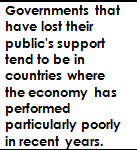 There is a strong correlation between how people view government generally and their assessment of their country’s economy. Governments that have lost their public’s support tend to be in countries where the economy has performed particularly poorly in recent years.
There is a strong correlation between how people view government generally and their assessment of their country’s economy. Governments that have lost their public’s support tend to be in countries where the economy has performed particularly poorly in recent years.
Argentina may be Exhibit A. Just one in a hundred Argentines think the economy is doing well. This is not surprising since the Argentine economy is expected to shrink dramatically this year and it has defaulted on its international debts. Just slightly more Argentines (7%) think their national administration is doing a good job. Similarly, only 7% of Japanese say the country’s economic situation is good (Japan’s economy is likely to contract this year), while 22% give their government a positive rating.
People in other countries with recent economic problems – Turkey, the Slovak Republic, Ukraine, Poland, Brazil, Peru and Venezuela – also hold their government in relatively low regard.
Bush, Putin Most Popular
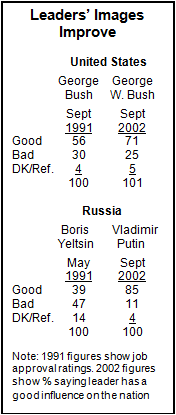 U.S. President George W. Bush and Russian President Vladimir Putin stand head and shoulders above their counterparts in personal popularity. Seven-in-ten Americans (71%) say Bush is having a good influence on how things are going in the country and 85% of Russians feel the same way about Putin. Both leaders are held in significantly higher regard than their predecessors in the 1991 “Pulse of Europe” survey. Bush’s rating is 15 percentage points higher than that of his father, George Bush. Putin’s rating is 46 points higher than Boris Yeltsin.
U.S. President George W. Bush and Russian President Vladimir Putin stand head and shoulders above their counterparts in personal popularity. Seven-in-ten Americans (71%) say Bush is having a good influence on how things are going in the country and 85% of Russians feel the same way about Putin. Both leaders are held in significantly higher regard than their predecessors in the 1991 “Pulse of Europe” survey. Bush’s rating is 15 percentage points higher than that of his father, George Bush. Putin’s rating is 46 points higher than Boris Yeltsin.
By comparison, 62% of the French hold a positive view of French President Jacques Chirac (the survey was taken after the French presidential election), while 54% of the British believe Prime Minister Tony Blair is a positive influence on the country. Canadian Prime Minister Jean Chretien has the support of about half (48%) of his citizens. And Prime Minister Junichiro Koizumi of economically beleaguered Japan has the least support among the G-8 leaders. Just 38% of the Japanese respondents give him a good rating.
European attitudes toward their political leadership have generally improved in the last decade, with some exceptions. Support for the president or prime minister has grown markedly in France (approval rating up 11 points), Germany (up 16 points), Poland (up 16 points), and Ukraine (up 14 points).
However, there has been a sharp reversal of public sentiment toward elected leaders in the Czech and Slovak Republics. In the first blush of good feelings after the fall of the Iron Curtain, 68% of Czechs approved of the job Vaclav Havel was doing. But in this survey, only 46% of Czechs have a favorable reaction to former Prime Minister Milos Zeman. (Vladimir Spidla is now prime minister.) Fewer than four-in-ten Slovaks (38%) feel positively about their prime minister, Mikulas Dzurinda. There has been a similar 19-point falloff in approval for the leadership in Bulgaria.
Support is high for the leaders of a number of other major countries. Three-quarters of Indians give Prime Minister Atal Bihari Vajpayee good marks. After two years in office and despite growing criticism at home, two-thirds of Mexicans still think reform-minded President Vicente Fox is doing a good job.
Seven-in-ten Indonesians are similarly supportive of President Megawati Sukarnoputri. And Philippine President Gloria Macapagal Arroyo, whose government is locked in a war with Muslim guerrillas, enjoys equally strong approval.
People in countries with authoritarian regimes give their leaders, such as Islam Karimov of Uzbekistan (95% approval) and Pervez Musharraf of Pakistan (76% approval), the high marks that might be expected for heads of governments that brook little opposition.
 The dubious prize for the leader least respected by his citizens goes to former Prime Minister Bulent Ecevit of Turkey: 91% of Turkish respondents thought was doing a bad job at the time of the survey. His government was replaced in the November Turkish elections. Among those heads of state still in power, poor grades were given to Alfonso Portillo of Guatemala (75% negative), Alejandro Toledo in Peru (76%) and Eduardo Duhalde (84%) of Argentina.
The dubious prize for the leader least respected by his citizens goes to former Prime Minister Bulent Ecevit of Turkey: 91% of Turkish respondents thought was doing a bad job at the time of the survey. His government was replaced in the November Turkish elections. Among those heads of state still in power, poor grades were given to Alfonso Portillo of Guatemala (75% negative), Alejandro Toledo in Peru (76%) and Eduardo Duhalde (84%) of Argentina.
Immigrants Unpopular in Europe
Although immigration does not rival other issues as a big problem in people’s minds, immigrants and minority groups are generally seen as having a bad influence on the way things are going by people in most countries. At the same time, people in societies that have traditionally supplied the industrial world with immigrants deeply resent that their fellow countrymen are leaving home to seek work abroad.
Only in Canada does a strong majority of the population (77%) have a positive view of immigrants. Immigration is the source of two-thirds of Canada’s annual population growth and about one-in-five Canadians is foreign born, which may explain Canadian attitudes. Among other major industrial countries, Americans – who fancy their country as an ethnic melting pot – show the greatest support for immigrants (49%). Nevertheless, a large minority (43%) believes immigrants are bad for the nation.
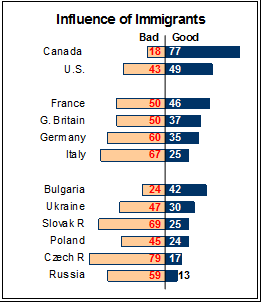 Immigrants are particularly unpopular across Europe. In every European country, except Bulgaria, immigrants are seen as having a bad influence on the country. This negative sentiment may reflect the fact that for the first time in modern history, Western European nations are becoming immigrant societies. People born in other countries now comprise a large and growing minority in all of the Western European countries surveyed.
Immigrants are particularly unpopular across Europe. In every European country, except Bulgaria, immigrants are seen as having a bad influence on the country. This negative sentiment may reflect the fact that for the first time in modern history, Western European nations are becoming immigrant societies. People born in other countries now comprise a large and growing minority in all of the Western European countries surveyed.
Negative sentiment is even higher in Eastern Europe. Strong majorities in the Czech and Slovak Republics take a dim view of immigration, as do a majority of Russians – a country where illegal immigration is soaring. Respondents in Poland and Ukraine have a somewhat less negative opinion of immigrants.
Deconstructing Anti-Immigrant Opinion
The survey finds considerable anti-immigrant sentiment in countries with shrinking economies, such as Argentina and Venezuela, where presumably competition is intense for scarce jobs. Yet frequently there is no clear linkage between attitudes toward immigrants and national economic conditions.
In Poland, where economic growth has been slow and unemployment high, people are less hostile toward immigrants than are respondents from the Czech Republic, where the economy has done slightly better. Similarly, unemployment is higher in France than in Great Britain. But the French hold immigrants in higher esteem than do the British, suggesting other non-economic issues may be important factors in public opinion toward immigrants.
Some rapidly aging industrial countries, such as Italy and Germany, which need workers to support their growing retiree populations, have the most negative attitudes toward immigrants. The same holds true in Japan, where nearly a fifth of the population is already over 65; still, more than half of Japanese have a negative opinion of immigrants.
Ironically, anti-immigrant sentiment is quite strong in a number of countries that have traditionally been a source of immigrants for other nations. In Guatemala, which sends thousands of its citizens to the United States each year, 58% of the survey’s respondents see immigrants as exerting a bad influence. In Turkey, which has supplied several million immigrants to Germany alone, half of those questioned say immigrants entering Turkey are bad for the country.
Emigration a Common Problem
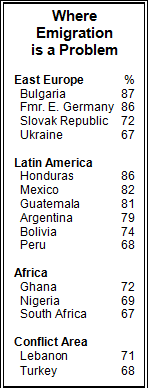 Meanwhile, people in Latin America, Eastern Europe and the Middle East/Conflict Area, areas that people have left in droves in recent years for better opportunities in Western Europe and the United States, resent the loss of their fathers and sisters, mothers and sons.
Meanwhile, people in Latin America, Eastern Europe and the Middle East/Conflict Area, areas that people have left in droves in recent years for better opportunities in Western Europe and the United States, resent the loss of their fathers and sisters, mothers and sons.
Strong majorities in countries ranging from Honduras and Mexico to Poland and Turkey say emigration is a problem in their societies. The brain-and-brawn drain is not a concern limited to residents of poor countries. More than half of Canadians (55%) and Italians (65%) also worry about the long-term national consequences of emigration.


